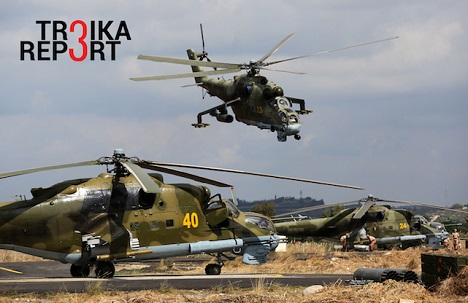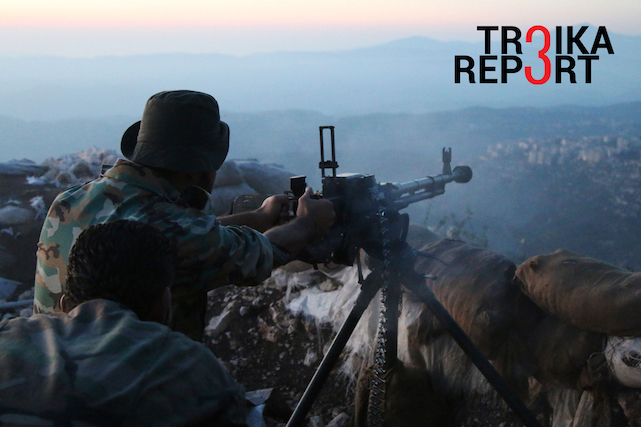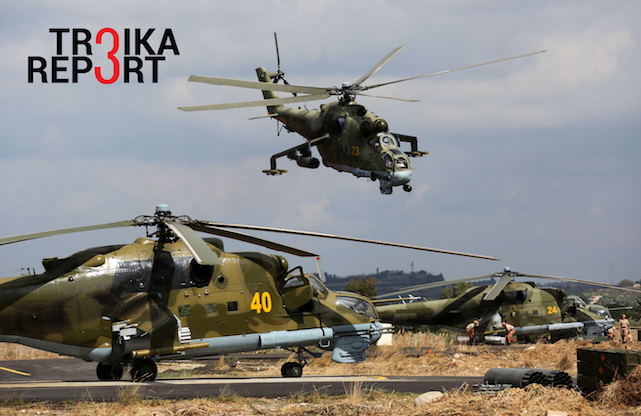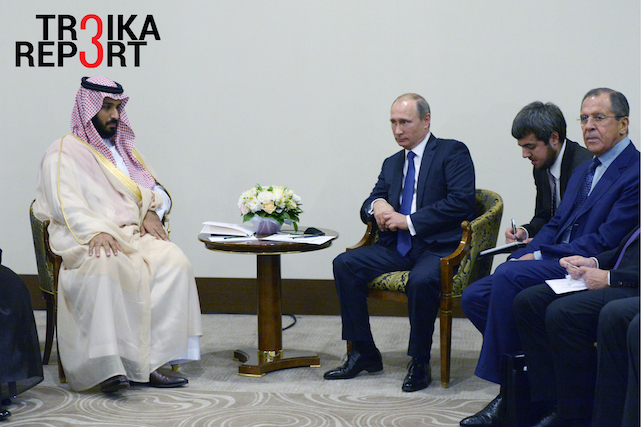TROIKA REPORT: What are the chances of a Russian second front in Iraq?

1. Donbass-Damascus: Coincidental similarities or Russian strategy?
 Syrian army personnel fire a machine gun in Latakia province, about 12 miles from the border with Turkey, Syria. Backed by Russian airstrikes, the Syrian army has launched an offensive in central and northwestern regions. Source: AP
Syrian army personnel fire a machine gun in Latakia province, about 12 miles from the border with Turkey, Syria. Backed by Russian airstrikes, the Syrian army has launched an offensive in central and northwestern regions. Source: AP
In some sense, the pattern of Russia’s behavior in respect to the rebel “republics” in the Donbass resembles its handling of the four-year old crisis in Syria.
The recent Syrian army counter-offensive, which came as a surprise for many, appears to be strikingly similar to the clashes at the end of summer 2014 around the self-proclaimed republics of Donetsk and Lugansk. Virtually on the brink of disintegration, the rebel regions suddenly fought off the assault of the more powerful Ukrainian army. It’s hardly a secret that Moscow simply did not allow the defeat of the predominantly Russian-speaking “republics.” – just as it has now saved Damascus from collapse at the last.
Are there similarities between Moscow’s policy toward the Donbass and its actions in Syria? Do they reveal a certain pattern of strategic thinking? Sergei Markedonov, an associate professor from the department of regional studies and foreign policy at the Russian State University for the Humanities, is not convinced the comparison is fully relevant. However, talking to Troika Report, he pointed out the lessons from the history of diplomacy now being projected onto the Syrian conflict.
“Moscow is seeking guarantees. It has the experience of the Balkan drama and of Libya. In both cases the arguments put forward by Moscow were either dismissed altogether or accepted selectively. Under such circumstances, Moscow wants to have a meaningful dialogue (with the West) on the basis of equality.
“A party to any negotiations is listened to if it has strong arguments on its side, and it is no big secret that military potential is just one of such arguments. The history of diplomacy serves as evidence. If someone cannot be conquered or even subdued, it paves the way to negotiations.”
Earlier, the same model was applied by Moscow to the crisis in the Donbass, where Ukrainian citizens, who at the time had no intentions either to set up a separate state or join the Russian Federation, rejected the legitimacy of the new parliament and government in Kiev and rebelled. The central authorities assembled a large military contingent, comprised of the regular army, paramilitary units of the nationalist group Right Sector, and battalions armed and financed by local oligarchs.
The self-proclaimed “people’s republics” of Donetsk and Lugansk were doomed to be overpowered. Nonetheless, this didn’t happen. On the contrary, it was the Ukrainian “army of conquest” that suffered a chain of defeats and came to a standstill. This was not only due to the reluctance of professional army officers and soldiers to fight in a civil war, or the resilience of the rebels who fought for their families and homes. Moscow most certainly provided the essential support that leveled the balance of power between the adversaries on the battlefield.
In the absence of a rapid victory and amid the deterioration of the security environment in eastern Ukraine, a group of four nations (Ukraine, Germany, France, and Russia) initiated peace talks in the Belarusian capital Minsk. Negotiations resulted in two sets of Minsk peace agreements, yet to be implemented in good faith and in full accordance with their letter and spirit but which are already underpinning the truce and a return to normal life in the Donbass.
Similarly, at the beginning of this year, no pundit could have envisaged that continental Europe’s two leading politicians, German Chancellor Angela Merkel and French President Francois Hollande, would have admitted the expediency of keeping Syrian strongman Bashar al-Assad in power for the time being, and even attempt to bring under one umbrella — to fight ISIS — the regime in Damascus and the anti-Assad Free Syrian Army. To make it happen, the warring parties had to accept the impossibility of gaining the upper hand and agree to start talking to each other.
So, how justified are parallels between the two cases of civil war, in Ukraine and Syria, and the foreign policy model followed by Moscow? In his comment for Troika Report, Alexander Rytov, an expert with the Institute of Europe of the Russian Academy of Sciences, emphasized that the two conflicts are different in nature and characteristics. However…
“…the only thing in common is the traditional maneuver aimed at reaching a balance of power, reaching parity on the military side as a precondition and stimulus to start negotiations. In Ukraine the inability to reach an end result by means of force produced the Minsk agreements. In Syria, the offensive by government troops could set the stage for talks with the ‘moderate’ opposition, with paramilitary units of other groups, and even with a moderate wing of ISIS which could emerge after the defeats on the battleground.”
Could the changing realities on the ground sweep aside the disagreements between Russia and the West, and the United States in particular? Could the proposed Putin-Obama summit be a game-changer? Military expert Ivan Konovalov, director of the Strategic Conjuncture Center, had this answer for Troika Report.
“The key issue, contentious as it is, at any potential meeting between Putin and Obama would be the political transition of the Syrian regime. The United States evidently would be anxious to draw a red line between its consent to cooperate with Russia in fighting ISIS and the legitimization of Bashar al-Assad’s rule, let alone contributing unintentionally to its strengthening.
“Yet the ongoing mediation by Moscow to stimulate inter-Syrian dialogue is also becoming part of the process. It means that at the potential summit Syria would be discussed not only in the context of the fight against ISIS but as a separate problematic topic.”
— The unexpected statement by Angela Merkel that Assad could be accepted as a sort of provisional ally in the battle against radical Islamists can be interpreted that the Western stance in respect to the regime in Damascus is now splintered. But is this really the case?
“It is more correct to say that it is not a sign of a divergence of views but a hint that priorities differ. Europe, unlike the U.S., cannot sustain for long the current turmoil in the Middle East since it keeps generating a flood of refugees and the danger of infiltration of the EU by radicals. Merkel seems to be one step ahead of Obama because for Europe the present turbulence comes at a higher cost.”
In sum, the strategy of “peace enforcement” is largely built on the first phase, when the party on the offensive is deprived of the chance to end as the only winner. In the Donbass conflict it was the Ukrainian army which Moscow sought to prevent from conquering the two self-proclaimed republics. In Syria, it meant stopping ISIS from taking Damascus. The second phase is to support the counter-offensive by what can be considered as pro-Moscow loyalists: in Ukraine those were the republics of Donetsk and Lugansk, and in Syria — the regime of Bashar al-Assad.
The third and most crucial phase, coming on the heels of a relatively re-established balance of power, is devoted to setting in motion the process of a political settlement. In this case, the new realities “on the ground” leave no option but to forge a compromise.
This conclusion is essentially supported by Yevgeny Satanovsky, president of the Moscow-based Institute of Middle East Studies, who shared his view with Troika Report:
“The Russian attacks on the positions of major terrorist organizations, Jabhat al-Nusra, Ahrar al-Sham, the Muslim Brotherhood, Islamic State and others, will give a chance for normal peace talks and a political process.”
Whether or not this line of thinking is the actual intellectual lining of Vladimir Putin’s policy regarding conflicts affecting the national interests of Russia is debatable. Yet there are too many coincidences and similarities to dismiss them outright.
2. What are the chances of a Russian second front in Iraq?
 The Russian attack helicopters MI-24 at the airfield "Hmeymim", Syria. Source: TASS
The Russian attack helicopters MI-24 at the airfield "Hmeymim", Syria. Source: TASS
The likelihood of Russia opening up a “second front” in Iraq is being widely debated, as well as the motives of the leadership in Baghdad. One argument seems to be the psychological gains of the first round of Russian air strikes on targets in Syria, which have created a sympathetic attitude among the Shia population, who are comparing it with the modest achievements of the year-long campaign of the U.S.-led coalition.
“Many Iraqis also harbor resentment at the extravagant and unfulfilled expectations that the American occupation should have rebuilt Iraq. Steeped in conspiracy theories, some say that the Islamic State’s persistence on the battlefield can only be a grand design of Washington,” Michael Gordon, observer for The New York Times revealed in a recent article for the newspaper.
The author also quoted Mohammed Hussain Hakim, a prominent Shiite cleric, who explained the grassroots feeling in the country: “The Iraqi street wants effective, practical engagement against ISIS. It is not about Russian military intervention per se,” he said.
The general mood among the Shiite majority is reflected in Facebook posts with a photoshopped image of President Putin dressed in the robe of a southern tribal sheikh and statements made by top officials. Hakim al-Zamili, the head of Iraqi Parliamentary defense and security committee, alleged that a formal request could be sent to Moscow with an invitation to launch air strikes on ISIS inside Iraq.
Moreover, al-Zamili suggested that one day the Russia-led anti-ISIS coalition might substitute the U.S.-led coalition.
Prime Minister Haider al-Abadi of Iraq remains more reserved, yet, speaking on the PBS NewsHour program, he made a telling admission, saying: “Inside Iraq, there are very dangerous guys, so I think to have the Russians on board will help me.”
Experts are split in their assessment of the probability that Russia will expand its military operation in the region and start a campaign against ISIS in Iraq as well. Is this really a possibility? Yevgeny Satanovsky, president of the Moscow-based Institute of Middle East Studies, mentioned two prerequisites in his comments toTroika Report:
“Islamic State controls almost half of the territory of Syria and 40 percent of the territory of Iraq. [Russia’s involvement would take place] …if the Iraqi government asks the Russian government for help to free their land, and then if the Russian political and military leadership decides to meet this request.”
— The fact is that the political class in Iraq is disunited, many groups and clans are opposed to inviting Russia, and should this happen, it might provoke a fundamental destabilization.
“The problem is that there is no unified country any more. There are areas controlled by the Kurds, areas administered by the Shiites, areas dominated by the Sunnis, areas under the rule of the terrorists. Iraq as it existed some 10-15 years ago does not exist any longer.
“If the Prime Minister of Iraq and his government invite Russia, I believe the Kremlin will consider all the options, and whether we can influence the course of events in Iraq. If Putin decides that this is a reasonable line of action, it will happen. If not, nothing will happen. We shall leave it to the Americans and their allies.
“The most interesting thing today is: If the U.S.-led coalition was successful, not fully but at least partially successful, why would the Iraqi Prime Minister discuss the option of Russia joining the fight against ISIS in Iraq as well?”
This all might sound probable if it were not for the internal feuds and divergence of interests and opinions within the Iraqi political class and society. Grigory Kosach, professor of Oriental Studies at the Russian State University for Humanities, clarified to Troika Report that powerful forces are opposing the idea:
The Iraqi Kurds, as well as the Sunni clergy and opinion-makers, consider it to be detrimental to their national interests. Should Prime Minister Haider al-Abadi decide in favor of such a move, he would be advised to first get the approval of all stakeholders. However, if he acts on his own, it would be considered a unilateral decision and would provoke political destabilization, emphasized professor Kosach.
It is reported that when striking at ISIS targets Iraqi fighter jets are already using as guidelines the intelligence data provided by the Russians through the Baghdad coordination center set up by Moscow, Tehran and Damascus.
However, judging by the statement of Russian Foreign Minister Lavrov, Moscow is limiting its military involvement to the Syrian front. It looks like this is as far as it wishes to go, at least for the moment. Russia appears to have drawn a red line for itself, leaving Iraq and the task of clearing it of Islamist jihadists to other members of the informal Russia-led anti-ISIS coalition.
3. King’s move: Saudi Prince playing chess in geopolitics with Putin

The Defense Minister of Saudi Arabia, Prince Mohammed bin Salman, President Vladimir Putin (left to right), Russian Foreign Minister Sergei Lavrov (right) during the meeting in Sochi, October 11, 2015. Source: Alexei Nikolsky/TASS
It was a sensational turnaround: Saudi Arabia and Russia have been at odds over Syria since the uprising against President Bashar al-Assad first began four years ago and nothing has changed since then; with the exception of a suspicion that the two nations are conducting a proxy war on the Syrian battlefield.
Given the consistent financial and logistical support rendered by Saudi Arabia to certain militant groups of the anti-Assad opposition, the trip by the son of the Saudi king, allegedly viewed as heir apparent, was a daring enterprise in itself.
The delicate diplomatic mission came after Sheikh Salman had brought a delegation of businesspeople to the St. Petersburg International Economic Forum (SPIEF) in June this year to talk about doing trade and looking for investment opportunities.
This time, apart from probing Moscow’s resolution in backing the ruler of Damascus, Sheikh Salman sought the answer to the crucial question for the desert kingdom: What are the limits to cooperation between Russia and Saudi’s arch-rival, Iran? In fact, channels of communications remain open, and the apprehension of Riyadh that it was being pushed into a corner by the new re-alignment in the region has seemingly been alleviated.
“We expressed our concerns that these operations could be regarded as an alliance between Iran and Russia,” revealed Saudi Foreign Minister Adel Al-Jubeir. “But in the conversation, our Russian friends explained to us that the main aim is the fight with ISIS and terrorism,” he concluded.
The meeting between Putin and Sheikh Salman, according to Russian Foreign Minister Sergei Lavrov, also produced a verbal agreement to pursue “common goals in Syria,” to be read as combating terrorism and achieving national reconciliation.
A post factum comment made by Lavrov sounded unexpectedly optimistic. He claimed that Moscow and Riyadh shared the goal of “ensuring the triumph of national reconciliation in Syria so that all Syrians, regardless of their nationality or religion, will feel masters of their land.”
This upbeat assessment could be misleading, since until now the two countries have differing interpretations of what is meant by “all Syrians.”
Nevertheless, the positive outcome of the meeting in Sochi cannot be discounted because now everyone has started talking about a political solution. As Lavrov pointed out, Russia is calling on “all external players who can influence political processes in Syria to promote the launch of a nationwide dialogue in Syria as soon as possible.”
To mitigate Saudi concerns that Russian air strikes are targeting mostly anti-Assad rebels, Moscow has offered to establish close cooperation between military command centers and security services in order, as Lavrov said, “to eliminate any doubts that the targets of the Russian Air Force are ISIS militants, the al-Nusra Front, and other terrorist organizations.”
On some sticking points Moscow and Riyadh have found common ground. The Saudis, as Al-Jubeir made clear, accept the concept of preserving the territorial integrity of Syria and admit that government institutions, including the armed forces, should be kept intact to ensure a future for the country.
The main unsettled issue remains the fate of Bashar Al-Assad: Saudi Arabia insists that he must step down to free the stage for a transition of power in Syria. How relevant is the survival for the time being of the ‘Bull of Damascus”? Is the fate of al-Assad part of the regional power play or part of the geopolitical grand game?
Yevgeny Satanovsky, president of the Moscow-based Institute of Middle East Studies, made the following comment for Troika Report:
“The Saudis’ interest in ruining Assad’s regime could bring us to the genocide of millions of people, and millions will be turned into refugees. This is what Russia must prevent. In Syria there are thousands and thousands of terrorists who are supported by Riyadh. Saudi Arabia is the major enemy of Assad’s regime, even bigger than Qatar or Turkey. Before Russia’s involvement there were illusions that local players could do in the region whatever they wanted, either in Afghanistan, or in Chechnya inside Russia, or in Libya, or in Iraq, or in Syria.
“This was a mistake. We came back. And we intend to do what we think is right to do with the terrorists in the region. This has come as a challenge to the Saudi leadership: What to do? This is the reason why Saudi supreme leaders keep coming to Russia, and talking to the Russian president, and rediscovering the world.”
One thing is clear: Bashar Al-Assad is a formidable stumbling block. Prominent historian Professor Georgy Mirsky, one of the leading experts on the Middle East in Russia, is certain that neither side can abandon its rigid stance. Moscow cannot dump Assad because it would be tantamount to admitting that it has been supporting the wrong person for four years. Riyadh is fixed on toppling Assad for the sake of its long-borne plans to install a Sunni ruler in Damascus.
Nevertheless, the frank discussion held in Sochi by President Putin and Sheikh Salman was useful within the logic of trying to avoid misunderstanding, without claiming to have found understanding. At least, both sides are in tune when it comes to ISIS, whose spiritual warlords have pledged to destroy the House of Saud, which they view as an infidel and corrupt dynasty.
The other potential driver of a rapprochement between Moscow and Riyadh could be economic interaction and trade, and multi-billion investment projects, for instance, building nuclear power plants — one of Russia’s few but indisputable specializations.
Since the Middle East is undergoing one of the most dramatic upheavals in its history, marked by the reconfiguration and realignment of its major players, at this point nothing can be excluded. One day, “going eastward” for Russia might mean positive engagement in joint enterprises with Riyadh – its competitor on the global oil market and enemy of its present ally, Syria.
All rights reserved by Rossiyskaya Gazeta.
Subscribe
to our newsletter!
Get the week's best stories straight to your inbox